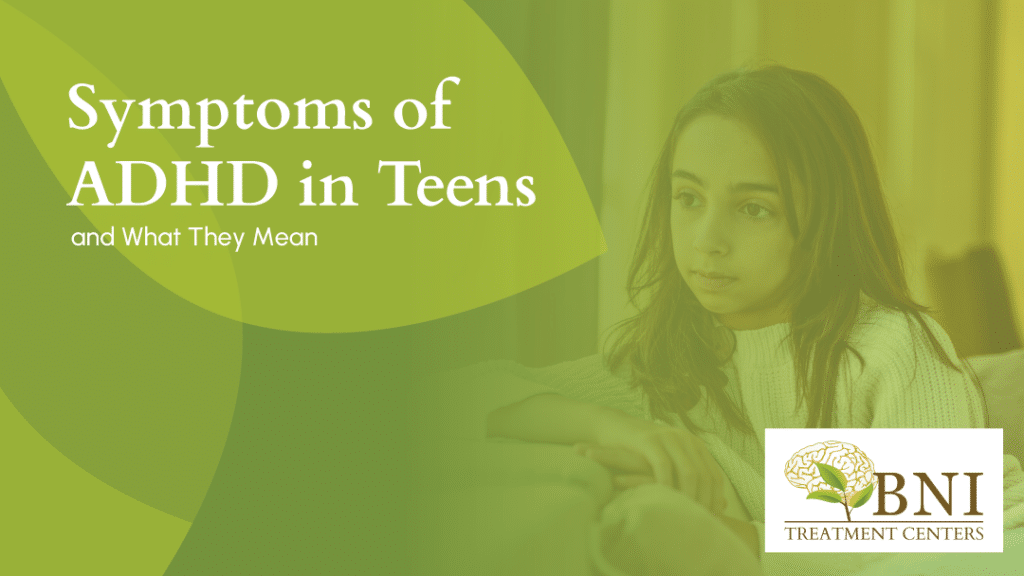ADHD in teens often goes unrecognized, untreated, and misunderstood. However, its impact can be profound. While symptoms like hyperactivity and low executive control may seem …
Symptoms of ADHD in Teens and What They Mean
BNI treatment’s ODD Treatment program combines evidence-based therapies such as CBT, DBT, behavior modification, and trauma-informed care to help teens gain control over their reactions, improve frustation tolerance, and develop healthier ways to communicate and cope.

ADHD in teens often goes unrecognized, untreated, and misunderstood. However, its impact can be profound. While symptoms like hyperactivity and low executive control may seem minor on the surface, they can greatly derail your adolescent’s life. Academic performance, relationships, and even health can suffer if these remain unaddressed.
It’s difficult to parent a teen with untreated mental health conditions. That’s why at BNI Treatment Centers, psychiatrists run our treatment teams. This allows for quick, accurate diagnoses, and the ability to treat any teens who come to our facility, no matter their condition. Once they have a diagnosis, we can make a plan for their recovery.
Understanding how ADHD can manifest in your teen is crucial for getting them the treatment and support they need. While ADHD is talked about more now than it was in the past, and around 5% of Californian youths are diagnosed with ADHD, many adolescents still grow up without a diagnosis. By knowing the symptoms of ADHD in teens, we can empower more young people to find the treatment they need to live healthy lives.
More Than Just an Annoyance: How ADHD Affects Teens
ADHD symptoms in children may at first seem more stressful on parents than the children themselves. But as teens grow, the symptoms of ADHD begin to impact their lives. Left unchecked, these symptoms can derail academic progress, strain relationships, and be incredibly destructive.
ADHD affects teens’ performance in school, with their symptoms giving them trouble focusing on assignments or turning them in on time. They usually have problems staying organized, which can lead to messy rooms and a tendency to misplace things they need. They may have memory problems, and their relationships can suffer due to their symptoms. Their increased impulsivity also makes them prone to riskier behaviors than their peers without ADHD.
While ADHD may be more apparent in children due to frequent hyperactivity, as they grow older, inattention often becomes the most prominent symptom. The hyperactivity can manifest as restlessness and fidgeting instead of the familiar “bouncing off the walls” associated with children with ADHD. Because of this, ADHD may be harder to diagnose in teens. This is why it is critical to get a diagnosis as soon as possible.

The Symptoms of ADHD in Teens and How They Manifest
The symptoms of ADHD in teens present differently from those of younger children. While every teen is unique, and will express these symptoms differently, there are several that are particularly common.
Lack of Focus
Individuals with ADHD hyperfocus on things that interest them to the point that they forget to take care of basic functions. Yet for other tasks, they can’t stay on track no matter how hard they try. To understand the lack of focus that comes with ADHD, it’s important to frame it as an inability to control what they focus on.
Finding daily tasks “boring” or tedious is also common in teens living with ADHD. This can involve something repetitive, something that doesn’t offer an immediate reward, or a task that takes a long time and isn’t exciting to them. This usually applies to homework and is part of the reason why students with ADHD may perform fine on tests, but fail to complete other assignments.
Teens with ADHD will frequently start projects and not finish them because they get distracted by something else. Sometimes, they’re unable to start projects no matter how hard they try, and this extends to activities they enjoy. Their brain just won’t focus on the “right” things. The adolescent with ADHD may be trying their best, but the symptoms of ADHD disrupt their efforts.
Self-Focused Behavior
People with ADHD can come across as self-centered. This is because they often have trouble focusing on matters outside of themselves, and their personal needs are easier to identify. Even then, adolescents with ADHD may have trouble tending to their own needs in certain circumstances, due to the increased effort needed to control their focus.
Individuals with ADHD also have a harder time controlling their impulses. This can cause them to act without thinking, sometimes disregarding the feelings and opinions of others. Often there is a decision to do what they feel is best at that moment, rather than stopping to consider the consequences.
While teens with ADHD are responsible for their own actions, the ability to control their focus needs time, effort, and attention to develop. Instead of labeling a teen as self-centered, it’s important to teach them self-awareness to better manage any self-focused behavior.
Heightened Emotionality
Teens already experience intense emotions due to puberty, and ADHD only exacerbates this. 34%-70% of adults with ADHD were found to have trouble regulating their emotions in a 2019 study.
This may seem obvious. Regulating emotions requires attention and effort – sometimes intense effort. An individual must notice what is happening around them, and how it affects their emotions. They then must replace their growing feelings with a more productive mindset – all of this in real time. For individuals with ADHD, who already face difficulties regulating their focus and effort, any problems can quickly compound.
When paired with the impulsivity that comes with ADHD, it’s not uncommon for teens to experience emotional outbursts. This contributes to higher levels of conflict between parents and ADHD teens.
Fear of Rejection
Teens with ADHD can experience intense negative emotions regarding rejection, referred to as rejection-sensitive dysphoria (RSD). Those with ADHD often react at a more intense level than those without it, with the instance of rejection devastating them. The scientific link between ADHD and RSD is currently unknown, but many with ADHD experience it. It can be especially difficult for teens still learning to navigate their emotions.
Difficulty Following a Conversation
Getting distracted during conversations and “zoning out,” missing important pieces of information, is a hallmark symptom of those with ADHD. Noisy, busy environments make it harder for them to focus on conversations, due to the increased stimulation of the environment.
They may also sometimes interrupt people and interject their thoughts at inappropriate times. This is often due to a fear of forgetting something important they want to say, or due to their lack of impulse control.
Trouble Working Quietly
While teens with ADHD are easily distracted, sometimes silence can make them uneasy. This makes reading or working on projects silently difficult. In these cases, listening to music on a low volume can help, especially if the music doesn’t have distracting lyrics or is purely instrumental.
Personal Hygiene Issues
These teens can struggle to keep up with personal hygiene. This is due to executive dysfunction, particularly with starting new tasks. Even things that seem simple, like showering or brushing their teeth, can be incredibly difficult for those with ADHD. Taking those first steps can feel impossible to them.
There may also be sensory processing issues with ADHD, where things like water pressure or towels can cause discomfort. Getting out of the shower may feel colder, making it more unpleasant. Some teens with ADHD lose track of time, and don’t make time for personal hygiene in their daily schedule.
Difficulty Following Directions
Adolescents with ADHD rarely ignore directions on purpose. Often, they’ll get distracted while listening to instructions, especially if the explanation is detailed or takes a lot of time. They can quickly forget what they’re supposed to be doing. This also ties back into issues with executive functioning, where prioritizing tasks can be difficult.
Trouble Compromising With Others
The combination of these symptoms – particularly those in conversation, executive processing, and managing emotions – can make compromising or negotiating with those who have ADHD much more difficult. Additionally, disagreements can sometimes cause ADHD teens’ rejection sensitivity to flare up, making them seem more emotional and less rational.

The Long-Term Risks of Untreated ADHD in Teens
Teens with ADHD face many challenges, and without treatment, these challenges can continue into adulthood and further negatively impact their lives. 35%-78% of adolescents diagnosed with ADHD maintain symptoms as an adult.
Maintaining these symptoms into adulthood can interfere with every area of their life. Once adolescents grow into adults and no longer have parents to look after them, they can easily forget and fail to start important tasks. Adults with ADHD are more likely than those without it to struggle to find and keep work. Those graduating high school with ADHD are also paid on average 17% less than those without it.
Seeking Teen ADHD Treatment in Los Angeles
It’s critical for those living with ADHD to learn and develop skills to manage their symptoms. While ADHD can’t be “cured,” treatment can have a significant impact, both by helping build supporting skills, and minimizing the underlying mechanisms of ADHD symptoms. Teen ADHD treatment is accessible, and can help teens take control of their lives, giving them a better and brighter future.
BNI Treatment Centers specializes in teen mental healthcare, with ADHD as one condition of many we treat. Our psychiatrist-led teams guide adolescents through customized care, teaching them the skills they need to manage their mental health conditions. Medication is also an option at BNI and can be added or changed when necessary. Call us at (888) 522-1504 to get started.
BNI Treatment Centers: Science-based, evidence-backed, compassion-led.
About the Author

Arastou Aminzadeh, M.D.
Dr. Arastou Aminzadeh or Dr. A as most teens refer to him, has been working in variety of clinical settings for the last 20 years. He is well respected nationally for his expertise in Addiction medicine and treating adolescents. Dr. A is a triple board certified physician in psychiatry, Child and Adolescent psychiatry and Addiction medicine.

Oliver Ahmadpour, M.D.
Dr. Oliver Ahmadpour is an adult and child psychiatrist with nearly four decades of experience in the field of medicine with an M.D. degree from Sweden, where he practiced as an Internal Medicine physician. In the U.S. he completed his Post-Doctoral Fellowship in Endocrinology at UCSD, and his Residency and Fellowship in Adult, Child, and adolescent Psychiatry at USC Keck School of Medicine.
Free Insurance Verification
News & Resources for Families
Check Out Our Recent Articles
Frequently Asked Questions
We treat a wide range of teen mental health challenges including anxiety, depression, bipolar disorder, OCD, trauma-related disorders, behavioral issues, ADHD, oppositional defiance, substance use, and dual-diagnosis conditions. Many families come to BNI after struggling to find the right level of care elsewhere.
Most private insurance plans cover a significant portion of treatment. Our admissions team verifies benefits quickly and explains coverage, deductibles, and out-of-pocket expectations before admission. We do not accept Medi-Cal or Medicare.
Yes. Many families come to BNI with teens who have complex diagnoses, treatment-resistant depression, severe anxiety, self-harm history, or previous hospitalizations. Our clinical leadership regularly treats high-acuity cases and provides specialized expertise for them.
Absolutely. We use established, research-backed modalities including CBT, DBT, trauma-informed care, psychiatric medication management, experiential therapies, family systems work, and integrative approaches such as mindfulness, yoga, and expressive arts.
Our residential and outpatient programs are located in private, secure homes in Agoura Hills and Calabasas. These areas are known for their safety, privacy, and access to nature—ideal for focused healing and recovery.
Yes. BNI is trusted by the UCLA David Geffen School of Medicine as a training rotation site for physician fellows to learn best practices in adolescent mental health—an acknowledgment of our clinical quality and leadership in teen psychiatry.
What We Treat
Primary Mental Health

Primary Mental Health
Behavioral Issues

Behavioral Issues
Dual-Diagnosis


